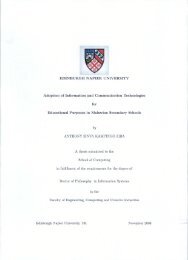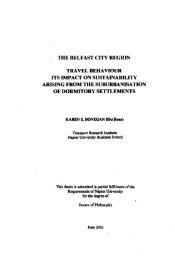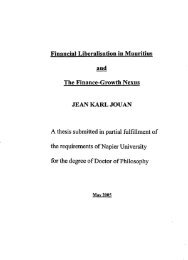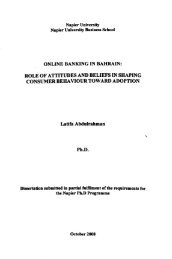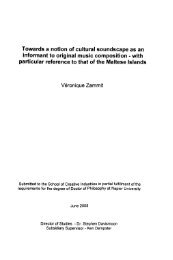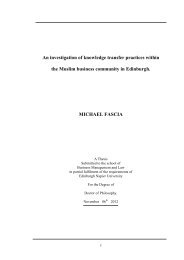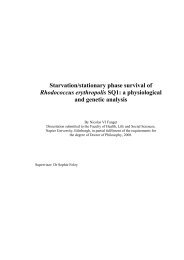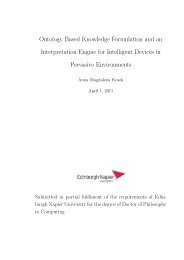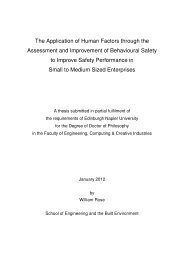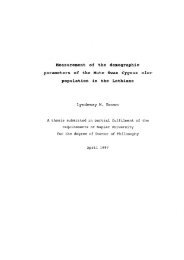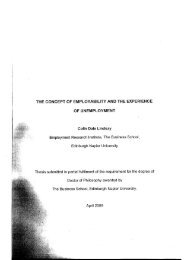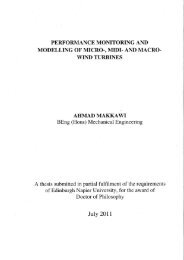The Role of Niche Tourism Products in Destination - Repository ...
The Role of Niche Tourism Products in Destination - Repository ...
The Role of Niche Tourism Products in Destination - Repository ...
You also want an ePaper? Increase the reach of your titles
YUMPU automatically turns print PDFs into web optimized ePapers that Google loves.
One <strong>of</strong> the key policy contributions <strong>of</strong> my research has been the development <strong>of</strong> a research agenda (ACCESS) to exam<strong>in</strong>e the<br />
wider implications <strong>of</strong> festival tourism i.e. socio- cultural and political practices which are <strong>in</strong>strumental <strong>in</strong> the development <strong>of</strong> any<br />
measurement tool to be used by policy makers and the <strong>in</strong>dustry. Hall and Rusher (2004) note the lack <strong>of</strong> research <strong>in</strong>to the political<br />
dimensions <strong>of</strong> events <strong>The</strong> progression <strong>of</strong> Getz’s (2002) work on festival failure <strong>in</strong> Paper 9 reveals its significance as the first cross<br />
country exam<strong>in</strong>ation <strong>of</strong> festival and event stakeholders.<br />
Through my work with the Ed<strong>in</strong>burgh Festival leaders (Paper 6), greater <strong>in</strong>sights are also given <strong>in</strong>to festival stakeholder perceptions<br />
on creativity, <strong>in</strong>novation and failure with<strong>in</strong> festivals. This addresses the gap <strong>in</strong> festival management research which to date has<br />
‘been post-hoc and outcomes-based with very little evaluation <strong>of</strong> festival formation, strategies or management processes’ (Paper 9,<br />
p.4). At a time when festivals are fac<strong>in</strong>g <strong>in</strong>creas<strong>in</strong>g governmental pressure to be accountable, and competition between cities as<br />
hosts for festivals <strong>in</strong>creases, these f<strong>in</strong>d<strong>in</strong>gs are significant and provide a valuable political tool for governments and local<br />
authorities. Langen and Garcia (2009) note a key research gap as be<strong>in</strong>g the lack <strong>of</strong> attention towards longer term impacts and<br />
longitud<strong>in</strong>al research. <strong>The</strong>y also make reference to ACCESS and its attempts to focus wider than economic impacts, <strong>in</strong> order to<br />
understand the complex benefits and dis-benefits associated with festivals. Earlier research with<strong>in</strong> the w<strong>in</strong>e tourism sector also<br />
contributed to the development <strong>of</strong> governmental policy, with the launch <strong>of</strong> the ‘W<strong>in</strong>e <strong>Tourism</strong> Strategy for Western Australia’<br />
(Dowl<strong>in</strong>g et al. 2000). This was one <strong>of</strong> the first and key regional w<strong>in</strong>e tourism policies <strong>in</strong> Australia and was <strong>in</strong>strumental <strong>in</strong> guid<strong>in</strong>g<br />
the development <strong>of</strong> w<strong>in</strong>e tourism <strong>in</strong> the region.<br />
<strong>The</strong> follow<strong>in</strong>g sections <strong>of</strong> this chapter summarise my contribution to tourism theory, practice and policy. <strong>The</strong> <strong>in</strong>dividual papers are<br />
discussed under the key thematic areas <strong>of</strong> my work:<br />
niche tourism product development;



